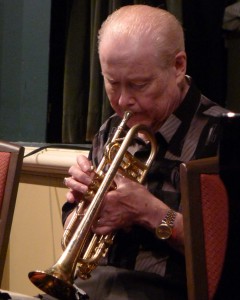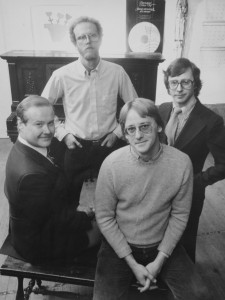
Remembering Larry Lake
By David Jaeger
Larry Lake’s life and work will be celebrated on Tuesday, the 26th of November 2013 in a public memorial at the Arts and Letters Club, 14 Elm Street in Toronto. The event will start at 7:30 pm.
I met my good friend Larry Lake in September 1970 at the University of Toronto. The day we met, we were among a group of students taking the Graduate Entrance Exam at the Faculty of Music. Larry already had three degrees from the University of Miami: a Bachelor of Music, a Master of Education, and a Master of Music in musicology, so why the U of T Faculty of Music felt he needed to be examined for graduate study is still, to me, a bit of a mystery. But I remember that he was seated in the back row of the examining room, not too far from another candidate, James Montgomery and when I entered the room Larry and Jim had already bonded. I took a seat in the front row, and I can still remember that there seemed to be a social club already under way at the back of the room.
We three were all deemed acceptable for graduate study, and soon found ourselves together in the bowels of the Edward Johnston Building, home to the U of T Electronic Music Studio, in the class of Prof. Gustav Ciamaga. Larry seemed more interested in electronic music than in the degree program he was enrolled in, which was as a PhD candidate in musicology. And he was far more intrigued by the challenges of contemporary composition than those of settings of Medieval Latin. Soon he and Jim & I were spending long hours together in the studio figuring out how to manipulate the cumbersome gear on the studio racks the way a real musician would play a proper instrument. The eventual formation of the Canadian Electronic Ensemble came nearer for us all, and the musicology doctorate receded for Larry.
In 1972 Larry was offered full-time employment as a music producer by CBC Radio. This opportunity gave him the perfect motivation to park the PhD and launch into a career that would harness two of his favourite activities: working with audio technology and communicating his passion for music with a national audience. And he was good at it. He quickly became the producer of several of CBC Radio’s flagship music programs: Musicscope, Themes and Variations and Music Alive. In the early 1970’s, network shows were still expected to run with so-called “staff announcers”; people like Ken Haslam, Lamont Tilden, Allan Maitland and Warren Davis, to name a few – but during Larry’s tenure in Radio Music, things began to change. Highly qualified presenters were sought as the Stereo Network developed. Larry was always good at spotting talent, and he easily found Karen Kieser and hired her to host Music Alive. She flourished on-air.
As Karen moved into program production, Larry made the CEE (Canadian Electronic Ensemble, established in 1971 by David Grimes, Larry Lake, David Jaeger, and James Montgomery) his focus and his main vehicle for composing. He was a gifted composer, and the CEE was an ideal outlet for his desire to mix musical technology with live performance. The CEE began touring during the mid 1970’s and we often were accompanied by an exceptional pianist, the talented, multi-tasking Karen Kieser, soon to become Larry’s wife.
I joined CBC Radio Music in 1973 and by 1977 I had convinced CBC Radio to support a national new music show for the CBC Stereo network. The new program was Two New Hours. It was originally hosted by David Grimes and Warren Davis. I could think of no better person to write for this show than Larry Lake.
The program enjoyed success, and lasted just under 30 years. Larry became the host in 1996, and was the voice of Two New Hours until 2007, when CBC cancelled the program. Larry remained with Two New Hours for its entire run because he believed deeply in the creative power of Canadian composers and musicians. His work on Two New Hours gave him a platform for developing this belief.
The fact that he was himself a gifted composer & musician, an incredibly articulate speaker & writer, and was a natural teacher made him particularly effective as an advocate for new music on air. His interviews with composers illuminated the thinking behind new compositions and helped listeners of all types to discover why composers create new music.
Larry always put a human face on these new creations. And he worked hard to introduce radio listeners to all the people that were involved in bringing the art of contemporary music to life, especially as it was practiced in Canada. He introduced CBC Radio Two listeners to the next generation of great Canadian composers as they emerged. He encouraged countless young, mid-career and even senior composers to realize their creative dreams. Larry’s life & work showed them it was possible.
This tribute originally appeared in the October 2013 edition of The Wholenote magazine and is re-posted here with permission.

